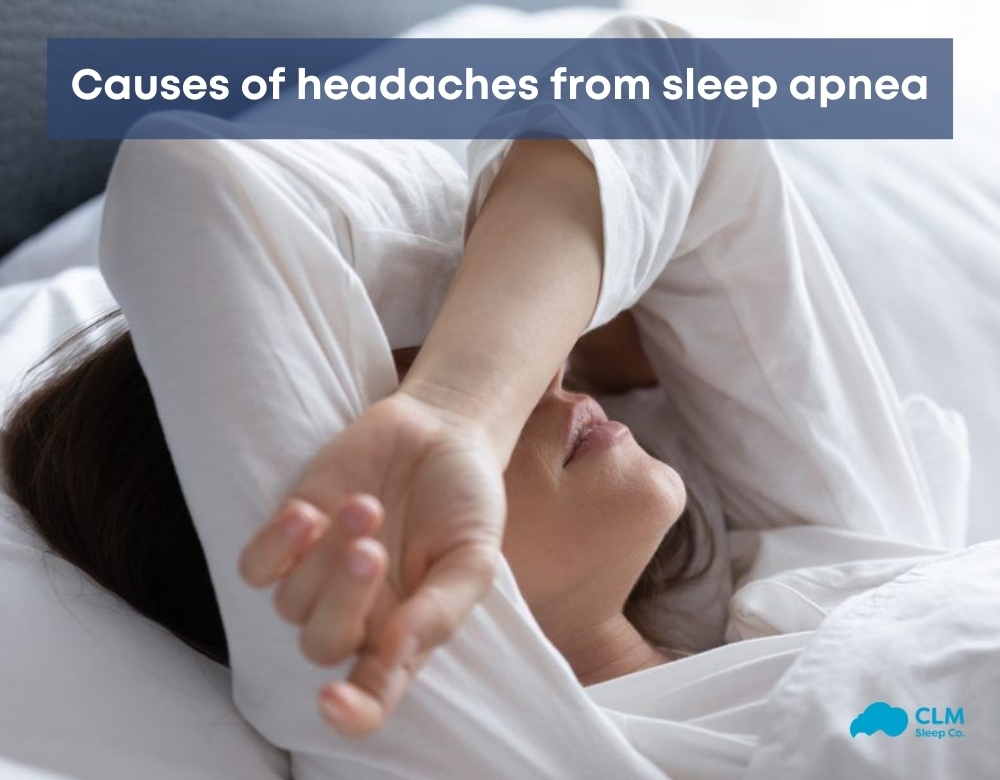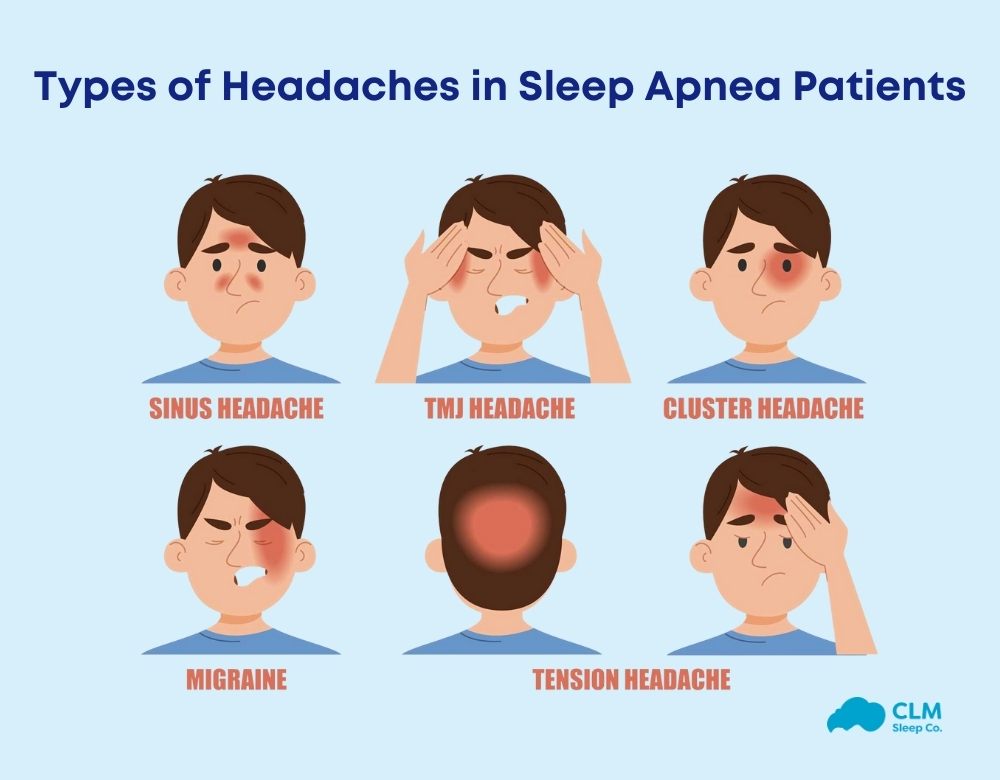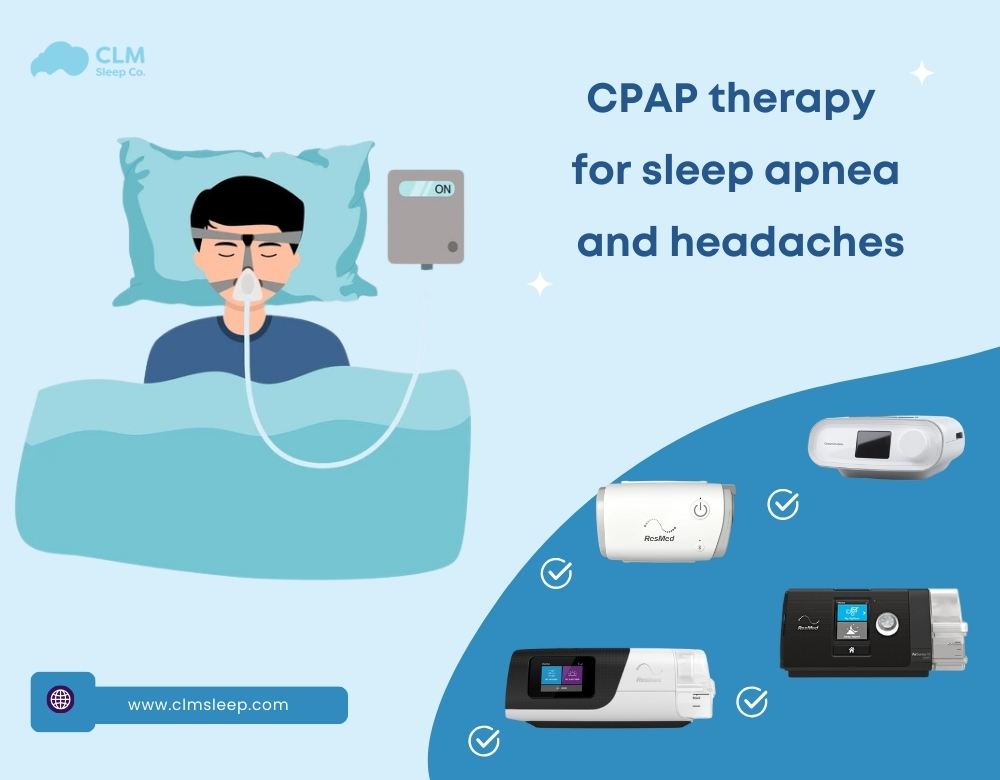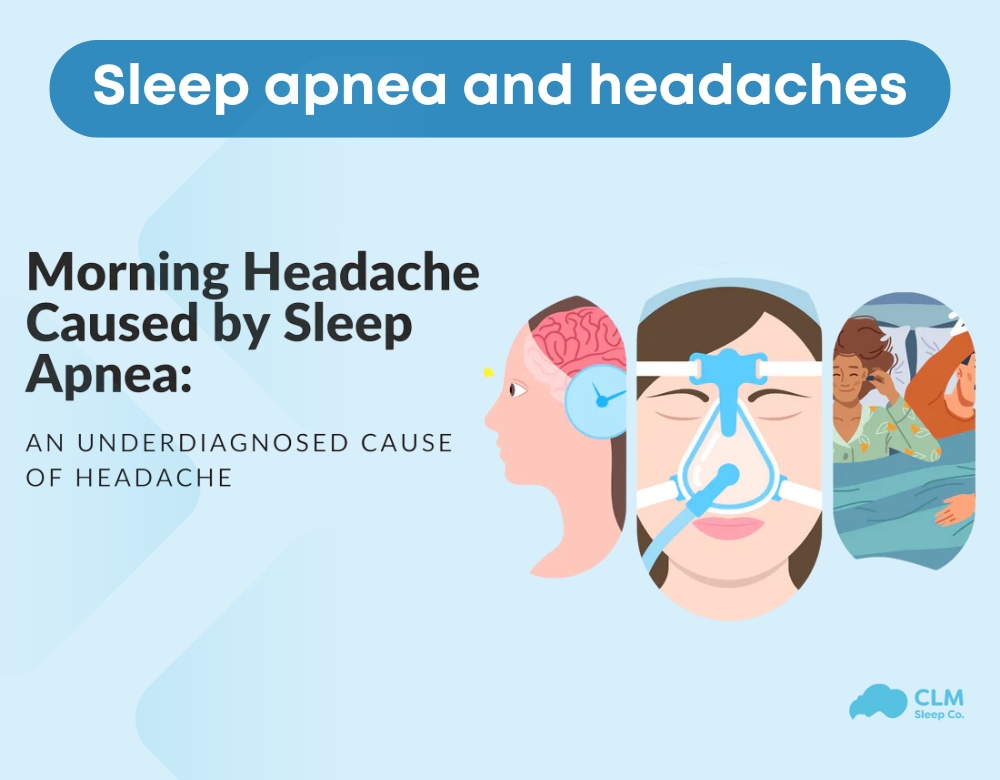The five percent of people who get morning headaches more typically do so for reasons related to stress, alcohol use, and illness. Some health conditions have been associated with morning headaches, mainly one being obstructive sleep apnea – a disorder that involves breathing problems as an individual sleeps. Read on to find out the causes of both sleep apnea and headaches, as well as workable solutions for the conditions at CLM Sleep.
Causes of headaches from sleep apnea
Sleep apnea can usually cause hypoxic headaches directly, characterized by a feeling of pressure in the head upon waking. These headaches are usually very short-lived and may occur for some time after sleep. In some cases, sleep apnea may also lead to other forms of headache; however, the relationship between the syndrome and hypoxic headache probably represents the most typical one.
Several physiological effects linked to sleep apnea can contribute to headaches, including:
- Reduced oxygen levels: The episodes of obstructive sleep apnea describe the blocking of the airway due to which there is reduced oxygen in the blood (hypoxemia) Low oxygen stimulates vessel dilation in the brain a common reason for vascular headaches.
- Carbon Dioxide Accumulation: Infrequent breathing gives rise to the level of carbon dioxide in the blood circulation (hypercapnia). This excess CO2 can dilate blood vessels; thus, even more contributing to the headache genesis.
- Disrupted Sleep Patterns: Being the most common effect of sleep apnea, the repetitive arousal attacks compromise deep, restful sleep thereby quality of sleep. This elicited disruption sways toward aggravating tension headaches or migraines.
- Systemic Inflammation: Chronic hypoxia and disturbed sleep are two mechanisms that initiate and drive inflammation within the body. Inflammation is implicated in the genesis of headaches.
- Increased Pressure Inside the Skull: The strain on respiratory muscles and changes in chest pressure during apnea events can elevate intracranial pressure, causing headaches, particularly upon waking.
- Jaw Tension and teeth-grinding: Sleep apnea is often associated with bruxism (teeth-grinding), which places stress on the jaw and surrounding muscles, leading to tension headaches.

Types of Headaches Common in Sleep Apnea Patients
Sleep apnea is associated with various types of headaches, each influenced by the condition’s physiological effects and sleep disruptions, such as:
Morning Headaches
Morning headaches are among the symptoms of sleep apnea, resultant of sporadic occlusion of the airways during sleep. The condition results in hypoxemia plus hypercapnia, whereby dilatation of blood vessels in the brain causes them dull pressure-like headaches. Typically, they start as the person wakes up and usually resolve within an hour. Getting treated for apparent sleep apnea can make such headaches lessen to a great extent in severity and frequency.
Migraines
In cases of migraines that are sometimes associated with sleep disorders like sleep apnea, typically they are unilateral, pounding headaches lasting hours to days associated with nausea, vomiting, and sensitivity to light and sound.
Migraines can be worsened by sleep apnea because it disrupt restorative sleep and increases stress levels. Unlike sleep apnea headaches, which occur upon waking, migraines may strike at any time; they can also occur during sleep. Proper management of sleep apnea could mean a lower frequency and intensity of migraines.
Cluster Headaches
Cluster headaches are a rare but intensely painful type of sleep apnea and headaches. They are characterized by sudden, severe pain, typically around one eye or on one side of the head, often accompanied by tearing, nasal congestion, or redness in the affected eye.
Unlike migraines or tension headaches, cluster headaches tend to occur in cyclical patterns, known as “clusters,” with attacks happening frequently for weeks or months, followed by periods of remission. Sleep apnea may act as a trigger for these headaches by disrupting the brain’s regulation of sleep-wake cycles. Addressing sleep apnea can help reduce the risk and severity of cluster headaches.
Tension Headaches
Tension headaches, often associated with stress and muscle strain, can also be linked to sleep apnea. These headaches are characterized by a dull, aching sensation, usually felt on both sides of the head, and may be accompanied by tightness in the neck and shoulders.
In sleep apnea patients, tension headaches may result from bruxism (teeth grinding) or muscle tension caused by disrupted, poor-quality sleep. Unlike migraines or cluster headaches, tension headaches typically lack additional symptoms like nausea or sensitivity to light and sound. Treating sleep apnea can alleviate the sleep disruptions and muscle strain contributing to tension headaches.
Headaches Due to Sleep Deprivation
Sleep deprivation, often a consequence of sleep apnea, is a common cause of headaches. These headaches typically present as a dull, aching pain, often accompanied by fatigue, irritability, and difficulty concentrating.
When sleep is disrupted by repeated apnea episodes, the lack of restorative sleep can lead to increased muscle tension, elevated stress hormones, and changes in brain chemistry, all of which contribute to headache development. Addressing sleep apnea to restore normal sleep patterns is essential for reducing the frequency and severity of headaches caused by sleep deprivation.

See more: Can Sleep Apnea Kill You? Risks and Consequences
Signs and Symptoms of Headaches Related to Sleep Apnea
Headaches caused by sleep apnea are common and often linked to poor sleep quality and reduced oxygen levels during the night. These headaches can manifest in various ways and may serve as an early indicator of an underlying sleep disorder.
Headache upon Waking Up in the Morning
One of the hallmark signs of sleep apnea and headaches is a persistent headache that occurs right after waking up. This is often due to disrupted sleep cycles and low oxygen levels during the night, leaving the body struggling to recover.
Persistent, Dull Ache
The headaches are usually described as a dull, constant ache that affects both sides of the head. Unlike migraines, these headaches are not accompanied by throbbing pain but can significantly impact your daily life if left unaddressed.
Headaches That Improve After Waking Up
Interestingly, many people notice that these headaches gradually subside within a few hours of waking. This improvement is attributed to the restoration of normal breathing patterns and oxygen levels during daytime activities.
Headaches Accompanied by Fatigue
Sleep apnea-induced headaches are often accompanied by extreme fatigue and daytime drowsiness. The lack of restful sleep can leave you feeling drained and unable to focus, further compounding the problem.
Facial or Sinus Pain
Some individuals experience facial or sinus discomfort along with their headaches. This could result from heightened pressure in the nasal cavities or muscle strain in the face brought on by interrupted sleep patterns. Seeking timely medical advice for these symptoms can help identify the underlying issue and provide effective sleep apnea treatment, ultimately enhancing sleep quality and overall health.
Poor Concentration and Irritability
Beyond the physical discomfort, sleep apnea and headaches often bring cognitive and emotional challenges, such as difficulty focusing, memory lapses, and heightened irritability. These issues typically stem from prolonged sleep deprivation and insufficient oxygen reaching the brain. Seeking timely evaluation and care from a healthcare provider can ensure accurate diagnosis and effective treatment, enhancing both sleep health and overall quality of life.
See more: Can Sleep Apnea Cause Weight Gain?
Treatment and Prevention of Headaches from Sleep Apnea
The effective treatment for headaches from sleep apnea is Continuous Positive Airway Pressure (CPAP) therapy. This approach uses a device that provides a steady flow of air to keep the airway open during sleep, preventing it from collapsing when breathing in.
With CPAP machines, the individual sleeps with a mask covering their nose or both nose and mouth. The mask is connected to the machine via a tube, and the motor generates a continuous stream of air that flows through the tube into the airway. CPAP therapy offers several health benefits, including:
- Lowering the risk of stroke
- Managing high blood pressure more effectively
- Enhancing memory and cognitive functions
A 2009 study found that 90% of sleep apnea patients experienced complete relief from morning headaches with CPAP therapy. This treatment also helps rule out other headache causes. Explore top CPAP devices from brands like ResMed, Fisher & Paykel, and Philips sleep apnea machines at Cpapdiscount.

Additional treatment options for sleep apnea and headaches include:
Oral Devices
Doctors may recommend oral devices, or they can be purchased over the counter (OTC). These include mandibular repositioning mouthpieces and tongue-retaining devices, which work by adjusting the tongue’s position to keep the airways open during sleep.
Surgical Procedures
Surgical interventions may also be effective in managing sleep apnea. Common procedures include:
- Adenotonsillectomy
- Implantable monitors
- Soft tissue removal from the mouth and throat
Conclusion of the article
Sleep apnea is a serious condition that disrupts sleep and often causes morning headaches due to oxygen deprivation. Treating it through CPAP therapy, oral devices, or surgery can improve sleep, reduce headaches, and enhance overall health. If you experience persistent headaches and fatigue, seek medical advice for diagnosis and treatment to restore restful sleep and well-being.
At CLM Sleep, we provide comprehensive diagnosis and treatment services for sleep apnea and headaches to help you regain quality sleep and improve your overall health. We also offer a range of top-brand treatment devices, including ResMed, Fisher & Paykel, and Philips, through Cpapdiscount.


